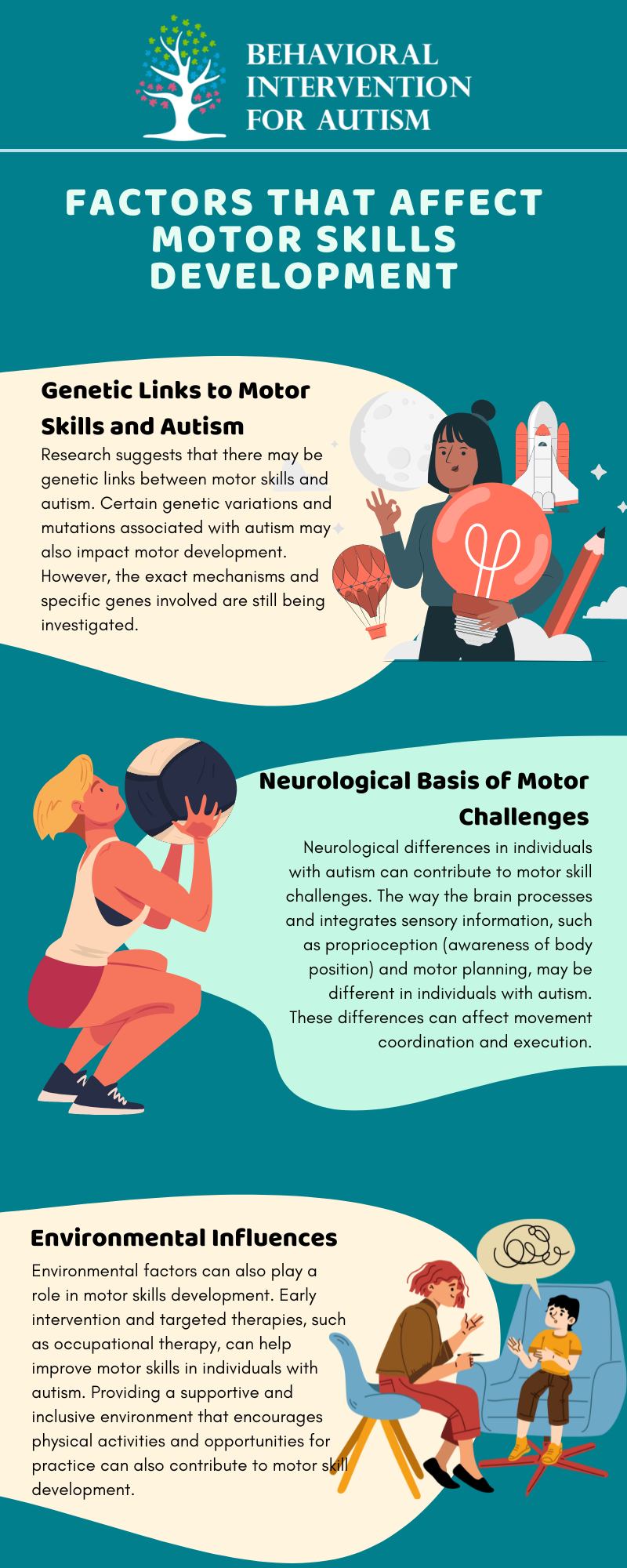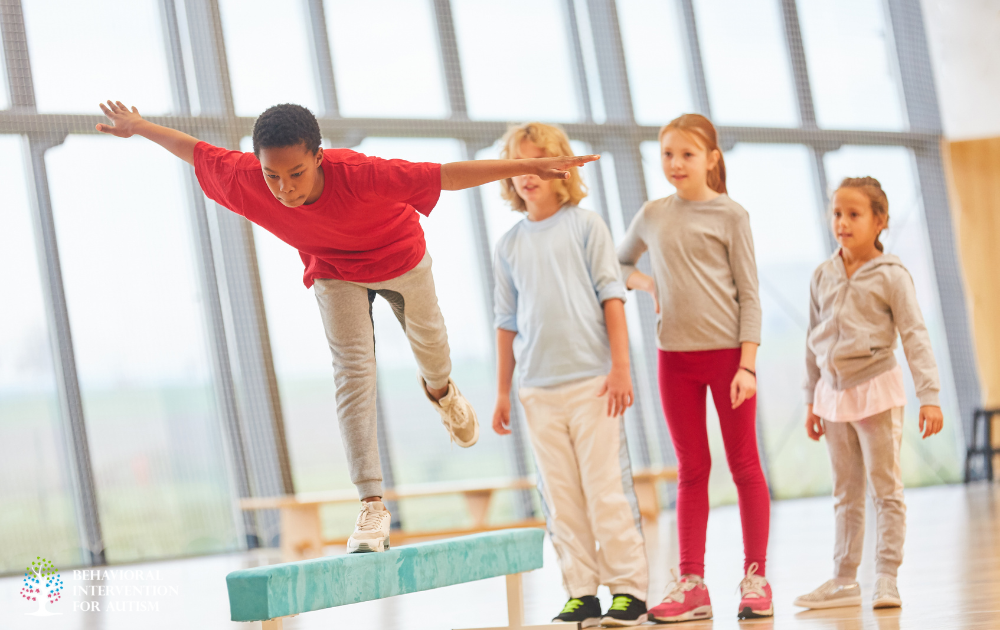
Table of Contents
Motor skills refer to the ability to control and coordinate movements of the body. In the case of autism, motor skills development can be affected, leading to challenges in various areas of movement.
According to research, approximately 80 percent of people with autism experience some form of movement problem, ranging from clumsiness or a mechanical style of walking to more profound difficulties.
Individuals with autism may exhibit difficulties in both gross motor skills, which involve larger muscle groups and whole-body movements, and fine motor skills, which involve smaller muscle groups and precise movements. These motor skill challenges can impact a range of activities such as walking, running, jumping, writing, and manipulating objects.
This brings us to the question: are autistic people clumsy? Let’s find out.
Motor Skill Challenges in Autism
Individuals with autism often experience challenges with their motor skills. These difficulties can manifest in various ways, one of which is clumsiness.
Clumsiness is a common motor skill challenge observed in individuals with autism. It can manifest as a lack of coordination, awkward movements, or difficulty with tasks that require precise control.
Research presented at the 2017 Society for Neuroscience annual meeting highlighted that young adults with autism exhibit an unusual gait and problems with fine motor skills, including clumsiness. This suggests that these motor issues persist into adulthood.
Children with autism may display an unusual walking style characterized by a wide stance and variations in stride length and width. These gait abnormalities can be indicative of problems in the cerebellum, a brain region responsible for coordinating movement.
Additionally, a study published in the Journal of Autism and Developmental Disorders found that clumsiness in children with autism may result from the same genetic mutations that contribute to the disorder.
Gait Abnormalities and Balance Issues
In addition to clumsiness, individuals with autism may experience gait abnormalities and balance issues. Studies have shown that adults with autism have slower reaction times and weaker grip compared to neurotypical individuals. They also take longer to take a step or a full stride, resulting in shorter strides and slower overall walking speed.
These motor challenges can impact an individual’s ability to navigate their environment safely and efficiently. They may require additional support and accommodations to promote mobility and independence.
Factors that Affect Motor Skills Development
There are several factors that contribute to the development of motor skills in individuals with autism. These factors include the following:
Impact on Daily Life
The persistence of clumsiness and other motor issues in individuals with autism can have significant implications for their daily lives. Difficulties with coordination and fine motor skills can affect their ability to perform self-care tasks, such as dressing, tying shoelaces, or using utensils.
They may experience challenges with activities that require precise hand-eye coordination, such as writing, drawing, or using tools.
Motor issues can also impact social interactions. Difficulties with coordination and balance may affect their ability to participate in sports or recreational activities, potentially leading to feelings of exclusion or frustration.
These challenges can also impact their ability to engage in activities with peers or develop age-appropriate motor skills.
Due to this, individuals with autism should receive appropriate support and accommodations to address their motor challenges. Occupational therapy and physical therapy can be beneficial in developing motor skills, improving coordination, and enhancing overall physical abilities. Learning and coping strategies can also be employed to help individuals navigate daily tasks and promote independence.
Clumsiness in Asperger’s vs. High-Functioning Autism
Clumsiness and motor skill deficits have been suggested as potential factors that could differentiate individuals with Asperger’s from those with high-functioning autism.
However, it is important to note that scientific research in this area has shown mixed results, and the distinction between these two subtypes of ASD is still a topic of debate in the scientific community.
While some studies have reported differences in motor skill difficulties between individuals with Asperger’s and high-functioning autism, other studies have found no significant distinctions. Therefore, it is crucial to approach these findings with caution and recognize that each individual with ASD may present with a unique combination of motor challenges.
Researchers have theorized that the motor skill difficulties in individuals with Asperger’s may be related to faulty proprioception, a sensory system problem that affects body position and movement perception.
It has been observed that individuals with Asperger’s perform well in motor activities that do not heavily rely on proprioception but struggle with tasks that require proprioceptive feedback.
Coping Strategies and Support
Fortunately, there are various coping strategies and support systems that can greatly assist in improving their daily lives. These strategies help individuals with autism develop their motor skills and navigate the challenges they may face.
Learning and Coping Strategies
Autistic individuals often employ multiple learning and coping strategies to manage motor coordination difficulties. By practicing and learning, they can gradually improve their motor skills over time.
Additionally, practical strategies such as organizing their environment, energy planning, and physical training can be beneficial.
It is not uncommon for individuals with autism to avoid activities that they find challenging. Recognizing these challenges and finding alternative ways to engage in similar activities can help them build confidence and overcome their difficulties. Seeking support from therapists, educators, and loved ones also plays a crucial role in their motor skill development.
Support Systems for Motor Coordination Difficulties
Motor coordination difficulties can have a significant impact on the social and emotional well-being of individuals with autism. These challenges can strain relationships, lead to bullying and exclusion, jeopardize safety, and cause negative emotions such as disappointment, envy, frustration, anxiety, and fear.
To support individuals with autism in managing their motor coordination challenges, it is important to create an inclusive and understanding environment. Providing access to specialized therapies, such as occupational therapy, can be immensely helpful in improving motor skills.
Additionally, offering emotional support and understanding can greatly enhance their overall well-being.
By implementing appropriate coping strategies and support systems, individuals with autism can navigate their motor coordination challenges more effectively. These strategies and support networks play a crucial role in improving their quality of life and empowering them to achieve their fullest potential.
Interested in how our services here at Behavioral Intervention for Autism in Florida can make a difference for you or your loved one? Reach out to us today to explore how we can help.
Sources:
https://www.thetransmitter.org/spectrum/autism-in-motion
https://www.ncbi.nlm.nih.gov/pmc/articles/PMC10237488
https://www.thetransmitter.org/spectrum/genetics-clumsiness-is-inherited-with-autism
https://www.kennedykrieger.org/stories/interactive-autism-network-ian/aspergers_syndrome_clumsiness
https://www.scientificamerican.com/article/autism-related-movement-problems-persist-until-adulthood
- 9 Common Obsessions of Children With Autism You Should Know - February 25, 2025
- What is Neurodiversity? A Guide to Embracing Differences - February 25, 2025
- Understanding Hyperfocus in Autism: What It Means and Why It Happens - February 25, 2025




